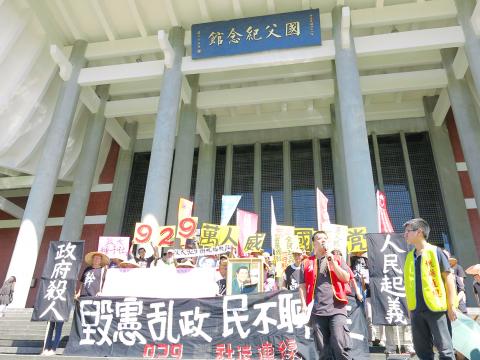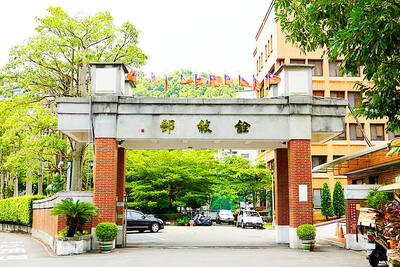The Chinese Nationalist Party (KMT) yesterday announced that it has decided to delay its 19th party congress, which was to begin on Sunday, due to civic groups’ plans to hold a rally against President Ma Ying-jeou (馬英九) on the same day outside the congress’ venue.
In an impromptu press conference, KMT Secretary-General Tseng Yung-chuan (曾永權) said that the venue for the meeting, the National Sun Yat-sen Memorial Hall, is a popular tourist destination, so the event had been canceled to avoid any possible confrontations involving demonstrators that could hurt passersby.
“The KMT is the ruling party, and as such has a responsibility to protect the public and defend people’s rights, which is why we decided to delay the congress,” Tseng said at the KMT headquarters.

Photo: CNA
The KMT had said last week that it would not change the date of the congress because of the anti-Ma demonstrations.
The party had been set to approve Ma’s re-election as KMT chairman at the congress, which was meant to serve as an occasion to strengthen party unity ahead of the seven-in-one local elections next year.
Tseng said that after discussing the various rallies and protests planned for Sunday with the party, the Taipei City Police Department had suggested that the congress be held at another location since it would be a challenge to maintain security at the Sun Yat-sen Memorial Hall.
Several civil groups joined forces with the National Alliance for Workers of Closed Factories to plan a demonstration outside the memorial on Sunday against the Ma administration.
Another anti-Ma protest planned for the same day and also organized by civil groups is to see demonstrators march from the intersection of Renai and Anhe roads, before converging at a rally on Ketagalan Boulevard in front of the Presidential Office Building.
“The KMT absolutely respects all legal rallies, but we are also worried about possible accidents… The Sun Yat-sen Memorial Hall is open to the public on Sunday and the safety of nearby businesses and residents is our main concern,” Tseng said.
The party is considering holding the congress at Chungshan Hall on Yangmingshan on Oct. 26, since the venue is far from downtown Taipei, which should make it easier to keep protesters at a distance.
However, the new date has yet to be confirmed as many KMT officials are scheduled to fly to China to attend a forum between the KMT and the Chinese Communist Party.
The party’s annual summit has been the subject of increased public focus amid the ongoing political battle between Ma and Legislative Speaker Wang Jin-pyng (王金平), whose invitation to the congress was rescinded after the KMT revoked his party membership over alleged improper lobbying.
Responding to the cancelation, Democratic Progressive Party (DPP) Chairman Su Tseng-chang (蘇貞昌) said that avoiding the protests by rescheduling would not solve any problems.
“The congress is supposed to be the KMT’s business. However, protests were organized for people to voice their opinions on Ma’s poor governance. As the ruling party, the KMT should respond to the public’s complaints,” Su said.
Su also endorsed the DPP’s boycott of a report that was to be delivered by Premier Jiang Yi-huah (江宜樺) to the Legislative Yuan and said that the DPP’s act would not suspend the legislature’s operation.
“However, Jiang should adhere to the constitutional principle of separation of powers,” he added.

Taiwan Semiconductor Manufacturing Co (TSMC, 台積電) is expected to start construction of its 1.4-nanometer chip manufacturing facilities at the Central Taiwan Science Park (CTSP, 中部科學園區) as early as October, the Chinese-language Liberty Times (the Taipei Times’ sister newspaper) reported yesterday, citing the park administration. TSMC acquired land for the second phase of the park’s expansion in Taichung in June. Large cement, construction and facility engineering companies in central Taiwan have reportedly been receiving bids for TSMC-related projects, the report said. Supply-chain firms estimated that the business opportunities for engineering, equipment and materials supply, and back-end packaging and testing could reach as high as

CHAMPIONS: President Lai congratulated the players’ outstanding performance, cheering them for marking a new milestone in the nation’s baseball history Taiwan on Sunday won their first Little League Baseball World Series (LLBWS) title in 29 years, as Taipei’s Dong Yuan Elementary School defeated a team from Las Vegas 7-0 in the championship game in South Williamsport, Pennsylvania. It was Taiwan’s first championship in the annual tournament since 1996, ending a nearly three-decade drought. “It has been a very long time ... and we finally made it,” Taiwan manager Lai Min-nan (賴敏男) said after the game. Lai said he last managed a Dong Yuan team in at the South Williamsport in 2015, when they were eliminated after four games. “There is

Democratic nations should refrain from attending China’s upcoming large-scale military parade, which Beijing could use to sow discord among democracies, Mainland Affairs Council Deputy Minister Shen You-chung (沈有忠) said. China is scheduled to stage the parade on Wednesday next week to mark the 80th anniversary of Japan’s surrender in World War II. The event is expected to mobilize tens of thousands of participants and prominently showcase China’s military hardware. Speaking at a symposium in Taichung on Thursday, Shen said that Chinese Minister of Foreign Affairs Wang Yi (王毅) recently met with Indian Prime Minister Narendra Modi during a visit to New Delhi.

FINANCES: The KMT plan to halt pension cuts could bankrupt the pension fund years earlier, undermining intergenerational fairness, a Ministry of Civil Service report said The Chinese Nationalist Party (KMT) caucus’ proposal to amend the law to halt pension cuts for civil servants, teachers and military personnel could accelerate the depletion of the Public Service Pension Fund by four to five years, a Ministry of Civil Service report said. Legislative Speaker Han Kuo-yu (韓國瑜) on Aug. 14 said that the Act Governing Civil Servants’ Retirement, Discharge and Pensions (公務人員退休資遣撫卹法) should be amended, adding that changes could begin as soon as after Saturday’s recall and referendum. In a written report to the Legislative Yuan, the ministry said that the fund already faces a severe imbalance between revenue